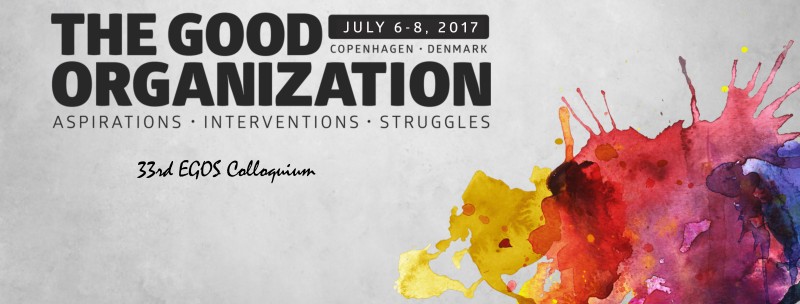Sub-theme 24: Organizing Business Collective Action
Call for Papers
Business collective action (BCA) is a widely prevalent, yet still poorly understood phenomenon. Though organizational research
acknowledges trade associations, political action committees, producer cooperatives, corporate front groups, research foundations
and other forms of business collectives, they are rarely the focus of empirical and theoretical inquiry (Barley, 2010; Walker
& Rea, 2014). This oversight is lamentable because in-depth analysis of business collective action offers opportunities
to challenge and enhance our existing theories of organizations and to gain insights into an increasingly important form of
organizing. The examination of BCA may help shed light on how organizations collaborate on interventions for the public good,
such as collective programs aimed at addressing issues such as environmental sustainability or human rights, or in pursuit
of their own interests, often at the cost of social welfare. These issues create a precedent for businesses to collaborate
in order to address collective problems and make use of collective resources. Yet, businesses face an inherent tension between
competitive and communal interests, which complicates collective action. In this way, BCA provides an excellent context to
examine sites of struggle between different actors and organizations (Lounsbury et al., 2003). As such, the aim of this sub-theme
is to generate discussion and debate within organization studies on the nature of BCA, its role and impact, as well as how
scholars in the area may study the phenomenon.
The majority of early research on business collective action
focused on corporate unity and mobilization in the political realm (Akard, 1992; Mizruchi, 1992). However, emerging research
in the area greatly expands the scope of BCA into a number of new areas. For instance, studies have begun to examine the role
of collective action in the establishment of self-regulatory institutions (Barnett & King, 2008; King & Lenox, 2000),
market creation (Lee, 2009; Sine & Lee, 2009), firm and industry reputation (Barnett & Hoffman, 2008; Winn et al.,
2008), the development of new organizational forms (e.g. Walker, 2009), and processes of institutional maintenance and change
(Gurses & Ozcan, 2015; van Wijk et al., 2013). This research, though in its infancy, opens up many new possibilities for
organizational research.
In hopes of building and expanding this emerging body of research, this sub-theme
encourages submissions from a diverse range of perspectives within organization studies that examine the phenomenon of business
collective action to spawn debate and discussion. We are interested in work that provides insights into the different forms,
antecedents, and consequences of BCA as well as the evolution of BCA and the many aspects related to the complex structure
and purposes of collective action. We invite submissions that examine BCA in a wide range of contexts and countries and from
multiple methodological perspectives.
Possible questions include, but are not limited to the following:
- Under what conditions is business collective action likely to emerge; for what purposes; and when do they result in new organizations? How are organizations of collective action structured and how are power relations defined within these organizations?
- How does business collective action shape the evolution of industries and organizational fields; how does BCA shape power relations in industries, issue- and organizational fields?
- How does business collective action influence firm or industry reputation/legitimacy? How is BCA shaped by the complexity of institutional pressures and diversity of interests that are likely to be faced?
- How may we as organizational scholars study business collective action and organizing? What methodological challenges exist, and how can we deal with these?
We thank Jochem Kroezen (University of Cambridge) for his valuable input
on this Call for Papers and his participation in the sub-theme.
References
- Akard, P.J. (1992): “Corporate Mobilization and Political Power: The Transformation of U.S. Economic Policy in the 1970s.” American Sociological Review, 57 (5), 597–615.
- Barley, S.R. (2010): “Building an Institutional Field to Corral a Government: A Case to Set an Agenda for Organization Studies.” Organization Studies, 31 (6), 777–805.
- Barnett, M.L., & Hoffman, A.J. (2008): “Beyond corporate reputation: Managing reputational interdependence.” Corporate Reputation Review, 11, 1–9.
- Barnett, M.L., & King, A.A. (2008): “Good Fences Make Good Neighbors: A Longitudinal Analysis of an Industry Self-Regulatory Institution.” Academy of Management Journal, 51 (6), 1150–1170.
- Gurses, K., & Ozcan, P. (2015): “Entrepreneurship in Regulated Markets: Framing Contests and Collective Action to Introduce Pay TV in the US.” Academy of Management Journal, 58 (6), 1709–1739.
- King, A.A., & Lenox, M.J. (2000): “Industry Self-Regulation Without Sanctions: The Chemical Industry's Responsible Care Program.” Academy of Management Journal, 43 (4), 698–716.
- Lee, B.H. (2009): “The Infrastructure of Collective Action and Policy Content Diffusion in the Organic Food Industry.” Academy of Management Journal, 52 (6), 1247–1269.
- Lounsbury, M., Ventresca, M., & Hirsch, P.M. (2003): “Social movements, field frames and industry emergence: a cultural-political perspective on US recycling.” Socio-Economic Review, 1 (1), 71–104.
- Mizruchi, M.S. (1992): The Structure of Corporate Political Action: Interfirm Relations and their Consequences. Cambridge, MA: Harvard University Press.
- Sine, W.D., & Lee, B.H. (2009): ”Tilting at windmills? The environmental movement and the emergence of the US wind energy sector.” Administrative Science Quarterly, 54 (1), 123–155.
- Van Wijk, J., Stam, W., Elfring, T., Zietsma, C., & den Hond, F. (2013): “Activists and Incumbents Structuring Change: The Interplay of Agency, Culture, and Networks in Field Evolution.” Academy of Management Journal, 56 (2), 358–386.
- Walker, E.T. (2009): “Privatizing Participation: Civic Change and the Organizational Dynamics of Grassroots Lobbying Firms.” American Sociological Review, 74 (1), 83–105.
- Walker, E.T., & Rea, C.M. (2014): “The political mobilization of firms and industries.” Annual Review of Sociology, 40, 281–304.
- Winn, M.I.,
MacDonald, P., & Zietsma, C. (2008): “Managing industry reputation: The dynamic tension between collective and competitive
reputation management strategies.” Corporate Reputation Review, 11, 35–55.


